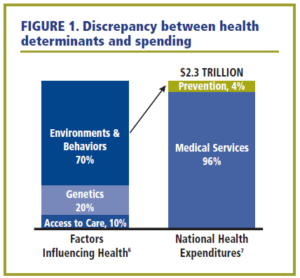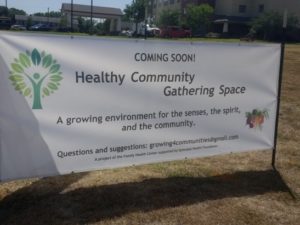Prosper Waco: Making the switch from “Sick Care” to “Health Care”
By Wendy Cox
If you’ve paid attention to the news over the last 10 years, you’ve likely heard debate around our nation’s healthcare system. In many respects it seems Americans really have a “sick care” system instead.

Figure 1. Discrepancy between health determinants and spending. Adapted from “Community Centered Health Homes: Bridging the gap between health services and community prevention,” by J. Cantor, L. Cohen, L. Mikkelsen, R. Panares, J. Srikantharajah, and E. Valdovinos, 2011, p. 4. Copyright 2011 by Prevention Institute.
We visit our clinics most often when we are already sick, and physicians are paid almost exclusively for treating sick patients. This model is financially burdensome (Figure 1). Environments and behavior, which can be changed, are at the root of most illness, and yet only 4% of our $2.3 trillion-dollar healthcare budget is spent to promote health and prevent illness. According to the Centers for Disease Control, chronic conditions like heart disease, diabetes, and obesity affect half of Americans and account for 75% of healthcare spending. Because chronic conditions are preventable with lifestyle and environmental changes around risk factors like diet and physical activity, our current models of care and funding don’t make financial sense. More money should be invested in creating healthy environments that lead to healthy behaviors.
With generous support from the Episcopal Health Foundation’s Community Centered Health Home (CCHH) grant, Family Health Center (FHC) is engaged in creating a more efficient model. A CCHH clinic acknowledges the factors outside of the exam room that affect patients’ health, and actively participates in changing them. FHC is doing this alongside community partners by addressing diet, physical activity, health-harming legal needs, access to green space, and community policy decisions.
 Family Health Center, along with our partners at World Hunger Relief, Inc. (WRHI) have implemented a prescription for produce program. Physicians write prescriptions for fresh produce, and WHRI delivers it to four clinics. Patients then fill their produce prescriptions at their clinic, much like they would pick up medication from the pharmacy.
Family Health Center, along with our partners at World Hunger Relief, Inc. (WRHI) have implemented a prescription for produce program. Physicians write prescriptions for fresh produce, and WHRI delivers it to four clinics. Patients then fill their produce prescriptions at their clinic, much like they would pick up medication from the pharmacy.
 Caregivers from FHC can also write prescriptions for exercise. With exercise equipment and fitness advisors provided by Baylor University, patients redeem their prescriptions at FHC’s Wellness Center located in the Madison Cooper Community Clinic.
Caregivers from FHC can also write prescriptions for exercise. With exercise equipment and fitness advisors provided by Baylor University, patients redeem their prescriptions at FHC’s Wellness Center located in the Madison Cooper Community Clinic.
FHC providers prescribe legal services to patients. Greater Waco Legal Services is teaming up with the Madison Cooper Community Clinic medical group to form a Medical-Legal Partnership aimed at helping patients address their health-harming legal needs as individuals, and on behalf of groups when clusters or trends are identified.
 FHC has made property available for the development of a health-promoting Community Gathering Space. Located next to FHC’s main site on Colcord between 15th and 18th, and guided by the expertise of Dr. Aime Sommerfeld-Lillard, this park-like garden space will offer clinic staff and neighbors a place to nurture their physical, mental, and social well-being.
FHC has made property available for the development of a health-promoting Community Gathering Space. Located next to FHC’s main site on Colcord between 15th and 18th, and guided by the expertise of Dr. Aime Sommerfeld-Lillard, this park-like garden space will offer clinic staff and neighbors a place to nurture their physical, mental, and social well-being.
FHC physicians serve on working groups of the Prosper Waco initiative. As part of a “Health in All Policies” approach, FHC physicians and staff are collaborating with other community members to embed health considerations into decision making on a broad range of efforts influencing health.
You’ve read this far, so you must be interested in moving our community from “sick care” toward a more holistic, efficient healthcare system, too! If so, there are several ways in which you can be involved:
- Contact FHC’s Development Director, Carlos Hinojosa, to contribute financially to any of the projects
- Get in touch with Rachel Ledbetter, FHC’s Volunteer Program Coordinator, to learn about ways to volunteer your time and expertise
If you want to learn more about any of the initiatives, see the links below:
Find out more about World Hunger Relief, Inc, Medical-Legal Partnerships, Greater Waco Legal Services, and Health in All Policies.
Watch these videos for more on Community Centered Health Homes and FHC’s produce and exercise prescriptions.
And for a real treat, enjoy Letitia’s story about her experience at FHC.
 After nearly 20 years as an educator, Wendy Cox returned to school and earned a master’s degree in Public Health from Baylor University. She is currently the Community Centered Health Home (CCHH) manager at Family Health Center and spends her days working with clinic staff and community partners to facilitate their work in making our community a healthier place to live. In her spare time, you’ll likely find her walking Waco’s extensive river trails, reading a novel, or watching a movie with her family.
After nearly 20 years as an educator, Wendy Cox returned to school and earned a master’s degree in Public Health from Baylor University. She is currently the Community Centered Health Home (CCHH) manager at Family Health Center and spends her days working with clinic staff and community partners to facilitate their work in making our community a healthier place to live. In her spare time, you’ll likely find her walking Waco’s extensive river trails, reading a novel, or watching a movie with her family.
The Act Locally Waco blog publishes posts with a connection to these aspirations for Waco. If you are interested in writing for the Act Locally Waco Blog, please email [email protected] for more information.
